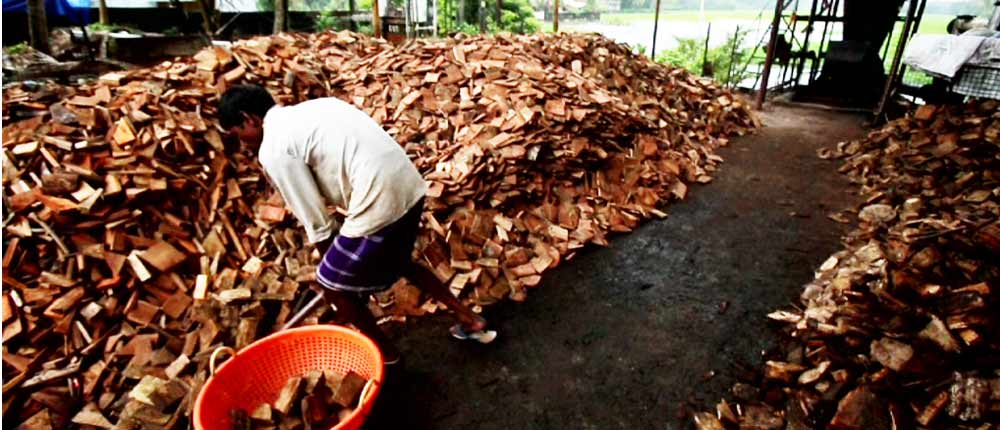Biomass gasifiers are a clean and cost-effective renewable energy source for the MSME sector in India

In India, growing concerns about long-term energy security, the environmental impact of fossil fuels, and their depleting reserves have created a stimulus to promote renewable energy, particularly in sectors where larger gains are possible. The micro, small and medium enterprises (MSMEs) is one such sector. It plays a critical role in India’s industrial output, exports, and employment generation. In fact, it provides the largest share of employment in the country after agriculture. Around 36.2 million MSMEs, spread over 180 clusters, provide employment to approximately 80.5 million people (Government of India 2013 Annual Report 2012/13, the Ministry of Micro, Small and Medium Enterprises, New Delhi). Together, they account for 45 per cent of India’s total manufacturing output and 40 per cent of its total exports.
Energy efficiency/fuel switching is at the centre of improving the competitiveness of the sector and reducing carbon emissions. There are many energy-intensive industries among MSMEs that still use commercial fuels, such as coal, oil & gas, or biomass inefficiently. In most of these industries, energy costs account for nearly 30-50 per cent of the total production cost. Further, these industries use a wide range of locally available cheaper fuels, which together with inefficient processes and technologies lead to adverse environmental impacts, especially at the local level.
Biomass gasifier
Biomass, which is fuel delivered from organic material, such as wood, agriculture residues, etc., is one such source of renewable energy in India that can generate considerable energy savings in the sector. It has been estimated that around 650 million tonnes of biomass is produced annually in the country. Of this, over 150 million tonnes is estimated to be surplus. This surplus, if used effectively in a cleaner energy form, can contribute significantly to meeting the country’s overall energy needs in a sustainable manner.
In a gasifier, solid biomass fuels (wood, agriculture residues, briquettes, etc.) are converted into gaseous fuel (producer gas) by a series of thermo-chemical processes. TERI has designed biomass gasifier systems that can meet thermal energy needs ranging from 25 kWth (kilo watt thermal) to 3 MWth, and meet the temperature requirements of MSME units ranging from 60 to 1,000 °C.
A journey of two decades
In the last decade, over 850 biomass gasifiers have been installed to meet the thermal energy needs of MSME clusters in the country. The experience has also demonstrated the financial viability of biomass gasifiers. The payback period for an MSME unit using different types of fossil fuels is anywhere between six to nine months. This period, however, increases to around two years if the fuel is replaced with biomass. Our experience in installing these gasifiers around the country also shows that there is a significant reduction in cost per unit of useful energy through gasification. If a fossil fuel is replaced, the reduction is as much as 60-80 per cent, while for biomass fuels, it is 50 per cent. These replications have established biomass gasifiers as a cost-effective energy delivery system.
For example, for thermal applications, such as water heating, hot air generation, drying, cooking and steam generation, the cost per unit of useful energy through gasification is 60 per cent lesser than furnace oil/diesel, etc., at current prices of diesel, electricity and biomass fuels, and 80 per cent lesser than using electricity. Another key economic benefit is improved productivity of MSMEs, and the subsequent improvement in the quality of end products as a result of better processes and uniform heat control.
The way forward
Our experience has shown that biomass thermal gasifier, as a renewable energy option, is economically viable and likely to remain so in the future. Past and present efforts have resulted in significant improvement in understanding the technology, in the acceptance and popularisation of gasifiers in MSMEs, and in the identification of key barriers and opportunities with respect to accelerated dissemination. However, to move forward, there is a need to address some issues.
One, a framework providing holistic energy policy for the MSME sector is required. There is a policy level commitment to renewable energy in general and for integration of renewable energy and energy efficiency in large industries. However, the MSME sector in itself does not have a holistic energy policy. A framework or policy/regulation is needed. Such a framework could have a target in terms of increasing the share of renewable energy, or regulations that mandate the use of renewable energy as the main source of energy for certain levels of thermal energy use in MSME units.
Second, stakeholders need to be strengthened and mobilised. An enabling framework will assist in mobilising industry associations and district industries centres, which play a key role in supporting MSMEs, to provide awareness and demonstration of these solutions. These associations and district centres can play a critical role in strengthening institutional structures to facilitate gasifier deployment too. Technical institutions are needed for skill development and training, and financial institutions too need to develop innovative financial products for MSME clusters.
Third, in order to scale up, there is a need to undertake a cluster approach with the objective of saturation with renewable energy solutions, either directly or along with energy efficiency measures. A cluster service approach with involvement of a local manufacturer/service provider offering multiple services of technology supply, biomass supply, maintenance, and awareness creation can be a potential model for accelerated diffusion.
If these conditions are met, there is a good possibility of making our MSME industries part of the solution, rather than problem in terms of reducing waste and energy usage.
